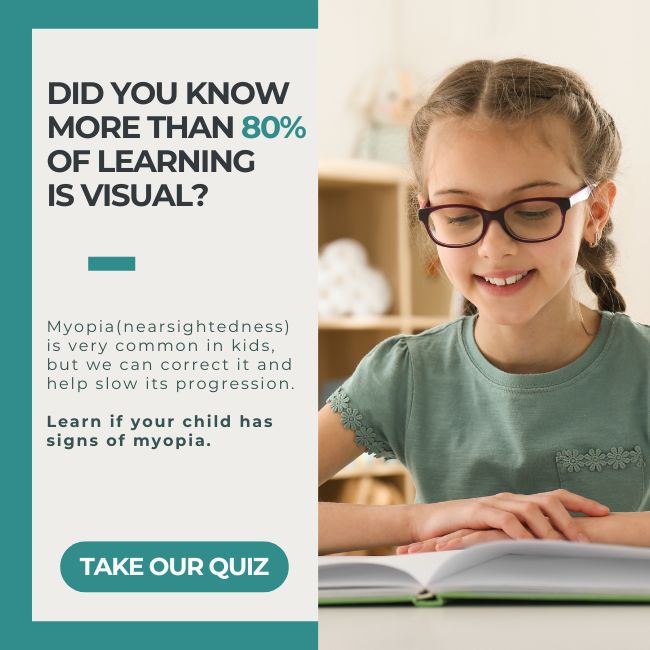What’s the big deal about UV light?
Recent studies have shown that many people do not realize the importance of wearing sunglasses to protect their eyes. Research has shown that 90 percent of consumers are aware that UV light can damage our skin, but only 10 percent know that it can damage our eyes!
Our eyes are exposed to UV-A and UV-B rays when we are outside. Exposure to UV light can lead to many eye conditions and diseases such as cataracts, age-related macular degeneration (the leading cause of vision loss in Canada), pterygium (an abnormal growth on the cornea), pinguecula (an abnormal growth on the white part of the eye), photokeratitis (sunburn of the cornea), and even cancer of the eye. The more UV exposure you have during your lifetime, the more likely you are to develop these conditions.
It is very important that children and teenagers wear sunglasses because they usually spend more time outside than adults. Children’s eyes are more susceptible to UV light than adult eyes because the lenses inside young eyes are less capable of filtering these high-energy rays. Young children should start wearing protective sunglasses outdoors as soon as they begin playing in direct sunlight.The World Health Organization estimates that our eyes get 80 percent of their lifetime exposure to the sun’s UV rays by age 18.
Here is a great link that explains kids’ sunglasses in more detail: http://www.allaboutvision.com/sunglasses/kids.htm
Macular Degeneration (picture of back of eye): Pterygium:


What type of Sunglasses are best?
In general, when looking for a good pair of sunglasses that will protect your eyes, it is advisable to purchase your sunglasses from a reputable business (ie optical shop or optometrist office). This will ensure that the product you buy meets industry standards for UV protection. You cannot tell how much UV protection a lens will provide by looking at the color or darkness of the lens. A clear chemical coating applied to the lens is responsible for UV protection. Eye doctors recommend wearing sunglasses with at least 99 percent UV A and UV B protection to avoid sun damage to the eyes.
Cheaper sunglasses that are found on stands and kiosks for example, are often imported from different countries and they may not comply with industry standards for UV blockage. Many cheap sunglasses may only absorb 40 percent of UV rays. It is possible to have sunglasses with a tinted lens that provides no UV protection, or have a low grade UV tint that degrades over time. Wearing tinted lenses that have no UV coat is actually worse than wearing no glasses! Our pupil enlarges in low light conditions – which means if you are wearing a tinted lens with no UV coating, your pupil will become larger allowing more harmful UV light rays to enter the eye!
When should I wear my sunglasses?
It is important to note that UV rays not only radiate from the sun, but they also reflect from the ground, water, and snow. Snow can reflect up to 80 percent of UV rays, while other surfaces such as the ground and water can reflect up to 10 percent. Therefore it is important to wear sunglasses when working outside, or doing recreational activities such as skiing, golfing, boating and tennis. Even on a cloudy or foggy day, it is important to wear sunglasses since UV rays can easily penetrate through clouds and fog.
Can Contact Lenses provide UV protection for my eyes?
Contact lenses can provide some UV protection. The average contact lens blocks only 10 percent of UV-A and 30 percent of UV-B. Currently, the only contact lenses that provide class 1 UV protection (more than 90 percent UV-A and 99 percent UV-B blockage) are Acuvue Oasys and Acuvue Advance lenses. Although this is definitely beneficial, these types of contacts lenses should not replace sunglasses for the simple fact that a contact lens only covers a small area of the eye. Sunglasses are still needed to protect the entire eye area and eyelids. We recommend that patients always wear sunglasses along with their contact lenses when outdoors.
Visit your eye doctor regularly
Regular eye exams with your Optometrist or Ophthalmologist are the best way to ensure that your eyes stay healthy. Your eye doctor will not only correct your vision (if required), but they will ensure you have no eye diseases, identify any issues that could lead to future problems, and discuss the types of lenses that are available for vision correction and UV protection.







